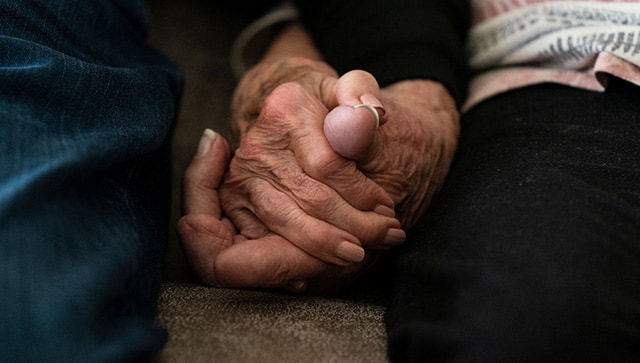Goldfish, a recently released film, explores the heartbreaking reality of dementia and its impact on both patients and caregivers. The film introduces us to Anamika, played by Kalki Koechlin, who is awakened in the early hours of the morning by her mother Sadhana, portrayed by Deepti Naval. Sadhana, dressed up for a supposed BBC recording, is actually suffering from dementia and no longer works at the BBC.
Dementia is a condition characterized by a gradual decline in cognitive abilities, including memory loss, impaired thinking, and emotional instability. As the disease progresses, individuals with dementia may struggle to recognize loved ones, lose track of time, and even forget basic skills such as reading. With over 8.8 million Indians over the age of 60 affected by dementia, it is crucial to raise awareness about this condition.
Dr. Binita Shah, an expert associated with the Dignity Foundation, explains that dementia can take many forms, including Alzheimer’s, Parkinson’s, and brain tumors. Both genetic factors and the environment can contribute to a person’s likelihood of developing dementia. Unfortunately, there is currently no cure for dementia, but its progression can be delayed through various interventions. However, due to the misconception that age-related memory loss is normal, awareness about dementia remains low among the general population.
What often goes unnoticed is the tireless work of caregivers who support and care for individuals with dementia. To gain insight into the unique challenges and rewards of this vocation, we spoke with five caregivers at the Mahim center of the Dignity Foundation in Mumbai. These caregivers, including P. Karthykeyan and Javed, all entered this field without prior knowledge or awareness of dementia. Yet, they all take immense pride and find fulfillment in their work.
Upon entering the center, one is greeted by patients engaging in various activities such as drawing, chatting, and sitting together. The walls are adorned with their artwork, while caregivers remain diligent and attentive. Patience and empathy are key qualities emphasized by these caregivers. Each patient’s individual needs are honored, and the caregivers tailor their activities accordingly. If a patient does not wish to participate in an activity at a particular moment, they are allowed to do as they please.
Karthykeyan, a volunteer at the center since December 2022, has made it his mission to serve those battling dementia. His personal experience of losing his father to the disease in 2001 inspired him to dedicate his retirement years to helping others. Reflecting on his own journey, Karthykeyan wishes he had possessed the knowledge and skills he now has to better care for his father. He remembers the confusion and worry his family felt as they struggled to understand his father’s behavior during that time.
The other caregivers at the center, such as Vivavari Vinod Kanshi and Jyoti Arun Chikalkar, were recommended for the position by friends. Kanshi initially joined the center as a cook and cleaner but gradually learned the art of caregiving through observation. Chikalkar, a former embroidery worker, unexpectedly found herself without a job due to the pandemic and decided to become a caregiver. Despite their different backgrounds, the profound impact of their work remains the same.
Javed Salim Kachi, another caregiver at the Dignity Foundation center, had prior experience in caregiving but faced new challenges when working with dementia patients. He had to learn how to navigate the unpredictable behaviors of these individuals, who could suddenly switch from aggression to affection. Over his two years of experience, Javed has come to understand the importance of responding to their actions with love rather than force. By allowing patients to forget and zone out, caregivers can minimize aggressiveness and foster a calmer environment.
Being a caregiver for dementia patients requires constant vigilance and monitoring. Any lapse in attention could lead to potential risks, such as patients wandering off or getting lost. The center takes extra precautions by strategically placing employees at different points, such as the gate and the lift, to ensure that no patient goes missing. Some patients even wear name tags to help them find their way back if they do wander off.
The center offers various activities for patients to engage in, such as drawing, chess, carrom, and crafts. These activities not only provide cognitive stimulation but also improve mental well-being. Javed emphasizes the importance of professional care for dementia patients, as isolation and lack of mental stimulation can worsen their condition.
Despite the memory loss associated with dementia, patients still hold onto their emotions. Javed explains that while patients may not remember people or events, the feelings associated with those memories remain intact. For instance, they may forget the names of their children but still remember their spouse’s name. The patients at the center often live in the past rather than the present, and their fellow patients become strangers to them. It is through the center’s love and attention that they find solace and companionship.
Goldfish sheds light on the often-unseen world of dementia patients and their caregivers. The film reminds society of the importance of understanding and supporting individuals with dementia and their dedicated caregivers.


